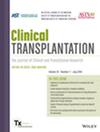Assessing the Quality of Life in Adult Lung Transplant Recipients Quality of Life Post-Lung Transplant
Abstract
Background
Significant limitations in daily life characterize end-stage lung diseases (ESLD) due to symptoms such as dyspnea, recurrent infections, side effects of immunosuppressive medication, and frequent need for hospitalizations. In addition to physical symptoms, ESLD is associated with emotional and social sources of distress such as depression, anxiety, fear of dying, financial concerns, and regular need for relocation. A transplant can significantly affect the recipients’ life domains, from physical and emotional well-being to social relationships and roles.
Objective
This study aims to assess the quality of life of adult lung transplant recipients in Saudi Arabia.
Method
A cross-sectional quantitative design was employed using the self-administered World Health Organization Quality of Life (WHOQOL-BREF) questionnaire, a sociodemographic and clinical questionnaire, and a medical chart review. The study was conducted in a tertiary care center in Saudi Arabia. Data were collected from November 2023 to April 2024.
Results
One hundred fifty-seven individuals with a mean age of 45 years had completed the questionnaire, and there was no participant refusal (Response rate = 100%). Males accounted for 61.1%, and most participants were married (63.7%). About half (44.6%) had at least one comorbidity outside ESLD. Only 26.7% were working post-transplant. Overall, the data strongly suggests that as individuals adjust and recover post-transplant, they tend to feel increasingly positive with time. Most rated their quality of life and health satisfaction as high. The lowest score was for the physical domain.
Conclusion
The study's findings showed that the quality was good overall across various domains, with moderate scores, with the lowest score on the physical domain. Improving rehabilitation strategies would help transplanted patients live more fulfilling lives.

 求助内容:
求助内容: 应助结果提醒方式:
应助结果提醒方式:


